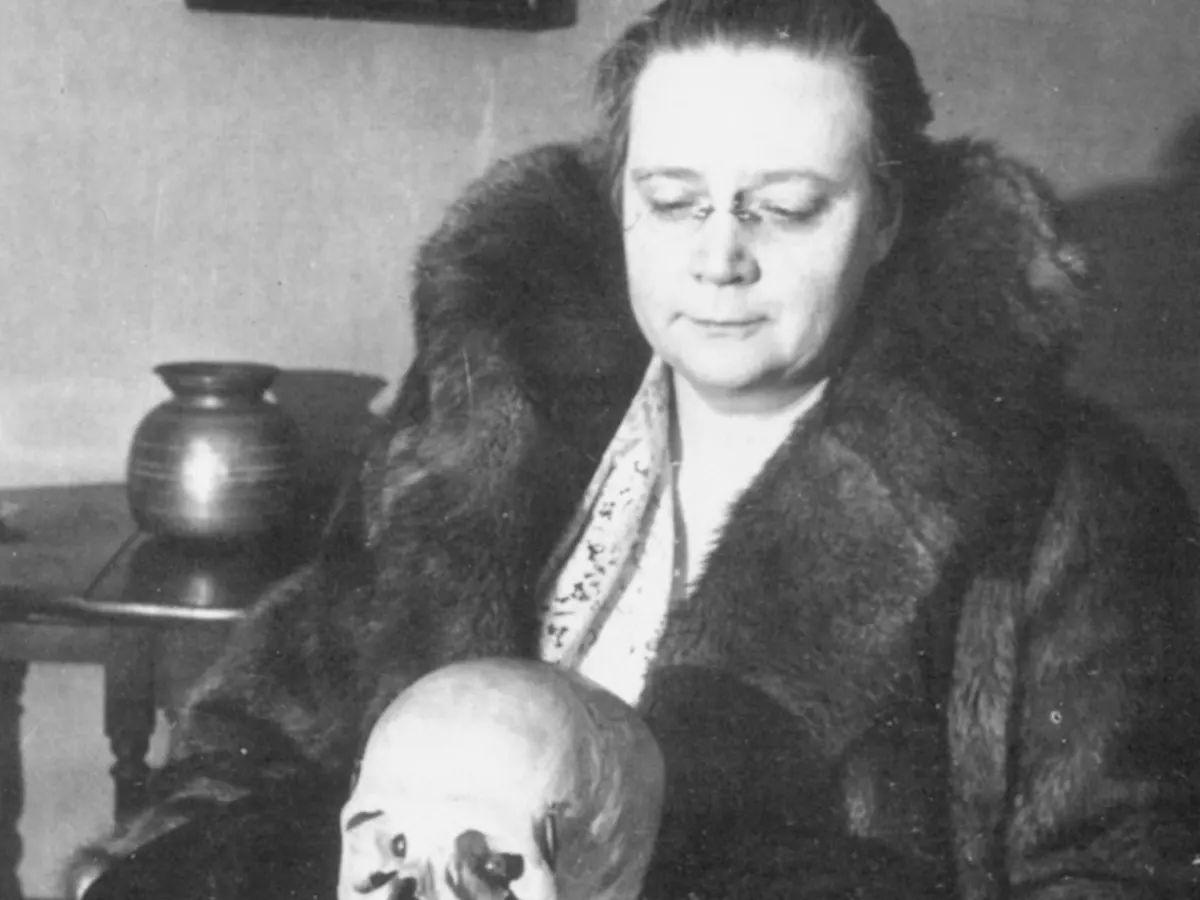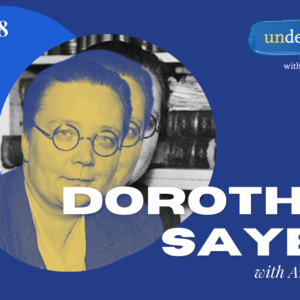Type Dorothy Sayers into Wikipedia and the first paragraph reads as follows:
“Dorothy Leigh Sayers was an English crime writer and poet.
“She was also a student of classical and modern languages. She is best known for her mysteries, a series of novels and short stories set between the First and Second World Wars that feature English aristocrat and amateur sleuth Lord Peter Wimsey.”
Such a lead certainly describes one aspect of Sayers’ life but falls far short of articulating the extraordinary impact she had through her writings on Christianity.
For that is perhaps Sayers’ most important legacy of all; through her work – most notably in her collection of plays The Man Born to be King, retelling the story of Christ in the common vernacular – she was able to pierce British indifference towards Christianity with the Gospel story she claimed was “the greatest drama ever staged”.
Between World Wars

A young Dorothy L. Sayers
Sayers established her reputation as a writer in the space between world wars.
Her first novel Whose Body? was published in 1923, which saw the debut of the beloved Lord Peter Wimsey, a caricature of a British gentleman-turned-detective.
Sayers quickly gained a reputation as one of the “Queens of Crime”, alongside celebrated writers Dame Agatha Christie, Margery Allingham, and Ngaio Marsh.
However, crime writing was but one factor in Sayers’ life.
She produced plays that were performed on stage and serialised as special broadcasts, whilst also writing works of theology and appearing regularly in the media.
She was also among the first cohort of women to ever be admitted to Oxford, where she rubbed shoulders with the brightest minds of British society.
From her scholarly gifts to wild popularity as both novelist and playwright (her plays became so successful they had to be staged in Cathedrals), Sayers was prolific.
But was there a central theme to it all? It’s a question that Dr Amy Orr-Ewing – acclaimed author, speaker, and theologian – grappled with while completing her PhD on Sayers’ work.
“You’ve got this extremely popular bestselling detective literature, and then you have religious plays … and then through to quite erudite essays and a book on the Trinity that she wrote called The Mind and Maker,” she said on the Undeceptions podcast.
“So one of the things I wanted to do was look at her work as a whole and ask the question … is there a unifying theme?
“In her detective fiction, you see this interest in a person looking at evidence and coming across imposter narratives: stories about what happened that turn out not to be true … she does that all in a narrative format in the context of a story.
“There’s all sorts of nuance there in the detective fiction where she’s beginning to explore concepts of how truth is revealed and discovered, and how you discern between truth and error.
“(But) then you go on to look at her religious plays and there the interest behind her initial plays centres on the idea that theology is a story and narrative. At the heart of certainly the Christian faith is the incarnation. God entered history as a human being and lived a life before other people, which is a story electrified, almost as a drama on a stage.”
From page to stage
While Sayers’ popular legacy will always be as a crime writer, her work as a playwright arguably had a more profound impact.
Her first “sacred” play (one with religious themes) Zeal of Thy House, which was commissioned for the 1937 edition of the Canterbury Festival, enjoyed well-received success in the UK, eventually having a run on the prestigious West End.
However, it was her 1941 opus – the aforementioned collection of plays The Man Born to be King – which sent shockwaves through British society with its presentation of Jesus’ life, as told through an everyday vernacular.
For Sayers, this societal brouhaha paled in comparison to the importance of letting the truth of the “divine drama” out.
“Let us, in Heaven’s name, drag out the Divine Drama from under the dreadful accumulation of slipshod thinking and trashy sentiment heaped upon it, and set it on an open stage to startle the world into some sort of vigorous reaction”, she wrote in a newspaper article at the time.
“If the pious are the first to be shocked, so much the worse for the pious – others will enter the Kingdom of Heaven before them.”
“(The plays were) unbelievably controversial at the time,” said Dr Orr-Ewing.
“(But) the impact of the Man Born to be King was that millions and millions of people listened to these plays and heard the ideas and the teaching of Jesus in a way that was relevant to them and were electrified.”
Check out this excerpt from The Man Born to Be King series
Despite her increasingly public profile, Sayers was adamant that her role was entirely different to that of a preacher or priest. Her job was to present the story of the Christian faith to people without the need to argue or persuade.
She was just a writer, taking inspiration from what she believed to be true.
Years after the first performance of The Man Born to be King, Sayers wrote:
“I never, so help me God, wanted to get entangled in religious apologetics, or to bear witness to Christ, or to proclaim my faith to the world, or anything of that kind. It was an honest piece of work about something I knew.”
Sayers felt that the British public was being deceived about Christ and his story, and saw her work as a way to explore the “truth” of the drama.
Eventually, over two million people tuned in to the plays in the Man Born to Be King series when they were aired on the BBC.
Such was their impact that William Temple, then Archbishop of Canterbury, wanted to bestow her with a Lambeth doctorate – a rare and prestigious honour awarded to people who have served the church in distinguished ways.
True to form, Sayers declined.
“I have concluded that it would be better for me not to accept the [doctorate] … there are certain practical considerations,” she wrote, in a public correspondence with the Bishop.
“The first, and perhaps the most cogent from the Church’s point of view is this: that any good I can do in the way of presenting the Christian Faith to the common people is bound to be hampered and impeded the moment I carry any sort of ecclesiastical label. In the present peculiar state of public opinion, it is the ‘outsider’ with neither dog-collar nor professional standing in the church who can sometimes carry the exterior defensive positions by the mere shock of a surprise assault; but the power to do this depends largely on remaining a free-lance.”
Check out her correspondence with the archbishop here
Friends in high places
Throughout the latter years of her life, Sayers continued to write voraciously and work in elite intellectual circles, eventually whipping up a friendship with C.S. Lewis.
The pair would go on to write to each other regularly and review each other’s work.
It was Lewis who wrote the Eulogy that was read at Sayers’ funeral when she passed away in 1957, at 64 years of age.
In his correspondence with American poet Mary Shelburne, recorded in the book Letters to an American Lady, Lewis writes of Sayers:
“She was the first person of importance who ever wrote me a fan letter.
“Her worlds (both in her person and her writings) were such that one felt in them something that was really above the common level of experience. If ever there was a woman who could work herself into a state of something very like religious fervour over a piece of literary or artistic work, that woman was she.”
From Sayers’ perspective, this perceived “religious fervour” was an afterthought: first and foremost her mission had been to simply present Jesus as she believed He was.
This was summed up in her 1938 essay The Greatest Drama Ever Staged. She wrote:
[It’s as if] Christ wasn’t born into history – He was born into the Bible (Authorised Version) – a place where nobody makes love or gets drunk or cracks jokes, or talks slang, or cheats, or despises his neighbours … no wonder the story makes so little impression on the common man.
“It seems to have taken place in a world quite different from our own, – a world full of reverent people waiting about in polite attitudes for the fulfilment of prophecies.”
Adapted by Alasdair Belling. Hear the full episode ‘Dorothy L. Sayers‘ on the Undeceptions podcast.

Want to be further undeceived?
Check out our network of podcasts and articles in the Undeceptions Library.











































